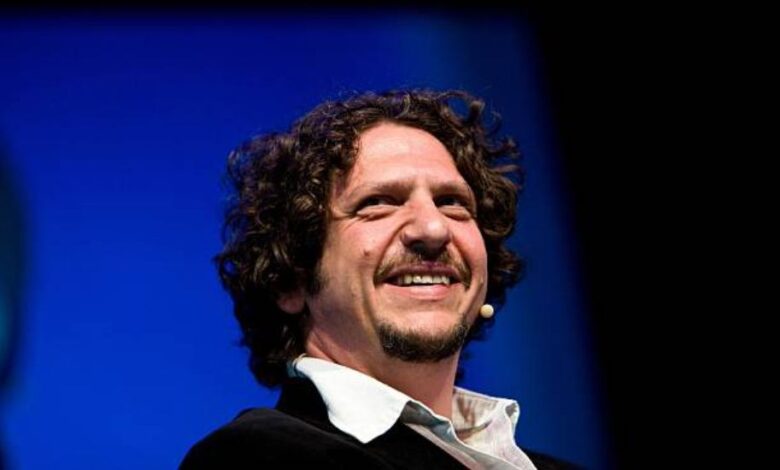Jay Rayner: From Family Table to Critic’s Desk

Born on 14 September 1966 in Brent, London, England, Jay Rayner grew up in a household where words, stories, and performance were everyday currency. His mother, Claire Rayner, was one of Britain’s best-known journalists, an advice columnist, broadcaster, and novelist. His father, Desmond Rayner, was an actor and artist, imbuing the home with creative and expressive energy.
Jay was raised alongside two siblings — his sister, Amanda Rayner, and his brother, Adam Rayner. The Rayner household was full of lively debate, plenty of laughter, and, most importantly, a deep appreciation for food and conversation. In later interviews, Jay described how their dining table was always abundant and how conversation often revolved around culture, current affairs, and curiosity. This atmosphere played a significant role in shaping his career outlook and the way he eventually connected storytelling with food.
Education and Formative Years
After completing his schooling, Jay attended the University of Leeds, where he studied politics. During his time there, he became editor of the student newspaper Leeds Student, which allowed him to discover his voice as a writer and develop the sharp editorial instincts that would later define his professional style.
Graduating in the late 1980s, he entered the world of journalism, combining intellectual rigor with a flair for vivid, accessible writing. His academic grounding in politics gave him an analytical framework that he would later bring into his restaurant critiques, seeing food not merely as sustenance but as a reflection of society, economics, and identity.
Career Trajectory: From General Journalist to Restaurant Critic
Jay Rayner’s career spans decades and a multitude of roles — journalist, critic, broadcaster, author, and musician. His journey began in national newspapers, including early work for The Independent on Sunday and The Mail on Sunday. In 1999, he joined The Observer as its restaurant critic, a position he held for more than twenty-five years until early 2025, when he transitioned to the Financial Times to continue his food writing.
Known for his witty, unfiltered prose and keen observations, Jay’s reviews stand apart for their honesty and humour. One of his most famous critiques was of the three-Michelin-starred restaurant Le Cinq in Paris, which he described as “the worst restaurant experience I have endured in 18 years.” The review went viral and confirmed his reputation as one of the boldest critics in modern British journalism.
Jay’s career also extended beyond print. He became a familiar face on British television and radio, serving as a judge on MasterChef and hosting BBC Radio 4’s The Kitchen Cabinet. Beyond reviewing restaurants, he wrote several novels and non-fiction books exploring food, travel, and culture. In addition, he is an accomplished jazz pianist and often performs with his band, blending his love for music and food into an expressive personal brand.
Personal Life: Marriage and Children
In 1992, Jay Rayner married editor and vocalist Pat Gordon-Smith. She has worked in publishing and has occasionally performed as a singer with Jay’s jazz group. Together, they have built a creative and close-knit family life centered on mutual respect and artistic collaboration.
The couple are parents to two sons, Eddie Rayner and Dan Rayner. Jay has often mentioned that his children have grown up surrounded by food, travel, and cultural conversation, much like he did. Their home life, though private, reflects the values of curiosity, good humour, and shared meals that have long defined Jay’s worldview.
Influences, Style, and Philosophy
Jay Rayner’s writing is a blend of intellect, empathy, and razor-sharp wit. Several key influences define his distinctive style:
-
Family Environment – Growing up in a home led by a journalist mother and actor father gave Jay an instinctive understanding of storytelling, performance, and authenticity. Meals at home were never just about eating — they were about debate, laughter, and experience.
-
Academic Foundation – Studying politics sharpened his analytical mind, allowing him to see dining through a social and ethical lens.
-
Critic’s Voice – For Jay, food criticism is never just about the taste of a dish. It’s about culture, value, behaviour, and ethics. He often highlights the broader context — how restaurants treat their staff, where ingredients come from, and how pricing reflects values.
-
Creative Breadth – His music and fiction writing show that his creativity is not confined to journalism. He uses rhythm, tone, and emotion in both his music and prose, giving his work a unique depth.
-
Fearless Honesty – Jay is renowned for saying what he means, whether praise or critique. He believes criticism is a form of service — guiding readers honestly through the vast and sometimes pretentious world of dining.
This blend of candour, intelligence, and humanity has made him one of the most influential food writers of his generation.

Milestones and Achievements
Jay Rayner’s professional life is marked by notable milestones:
-
In 1992, he won the “Young Journalist of the Year” award at the British Press Awards.
-
He received multiple honours for his food writing, including “Critic of the Year.”
-
He has published novels and non-fiction works such as The Man Who Ate the World, exploring global dining and culture.
-
He became a respected public speaker and media personality, regularly appearing on television, radio, and live stages.
-
His long tenure at The Observer established him as one of the most consistent voices in British food journalism, and his move to the Financial Times in 2025 marked the beginning of a new era.
Family Roots and Their Lasting Influence
The influence of Jay’s family runs deep through his personal and professional life. His mother, Claire Rayner, was known for her compassionate yet forthright voice as an advice columnist, and her ability to communicate clearly and honestly can be felt in Jay’s work. His father, Desmond Rayner, brought artistic and emotional awareness that shaped Jay’s sense of performance and nuance.
His siblings, Amanda and Adam, have shared in maintaining their parents’ legacy of curiosity and creativity. The family’s values — honesty, humour, and an appetite for life — are mirrored in Jay’s approach to both journalism and dining. Even after his parents’ passing, Jay has spoken about how their influence continues to guide him, blending emotion, intellect, and art in everything he does.
What You Might Not Know
Beyond his public persona as a critic, Jay is a man of diverse talents and interests:
-
He plays jazz piano professionally and often performs with his own band.
-
His studies in politics inform his perspective on dining as a cultural and economic act.
-
He frequently discusses ethical and sustainable eating, advocating for transparency in sourcing and fairness in hospitality.
-
Despite his reputation for sharp criticism, he often speaks of food as joy — something that brings people together and defines cultures.
The Narrative of Jay Rayner Today
Today, Jay Rayner stands as one of the most distinctive voices in British journalism. As restaurants and food culture evolve under pressures of cost, sustainability, and changing public expectations, his writing continues to engage readers with intelligence and humour.
His shift to the Financial Times represents not just a career change but a natural progression — an opportunity to reflect on decades of experience while still challenging the dining industry to do better. At home, his life with Pat Gordon-Smith and their children remains grounded in creativity, music, and shared meals. His background, rich with conversation and culture, continues to shape his unique perspective on the world.
Why His Story Matters
Jay Rayner’s story matters because it reflects the transformation of modern criticism. He demonstrates that food writing is more than describing flavour — it is about ethics, culture, and humanity. His career shows that being a critic is not about superiority but about honesty and storytelling.
He also reminds readers that professional identity is deeply personal. His life is the product of his family’s influence: a journalist mother who valued truth, an artistic father who valued beauty, and a home where dinner was always a stage for conversation.
Key Facts Recap
-
Name: Jay Rayner
-
Born: 14 September 1966, London, England
-
Alma Mater: University of Leeds (Politics)
-
Spouse: Pat Gordon-Smith (married 1992)
-
Children: Eddie Rayner, Dan Rayner
-
Parents: Claire Rayner, Desmond Rayner
-
Siblings: Amanda Rayner, Adam Rayner
-
Profession: Journalist, broadcaster, food critic, author, musician
Final Thoughts
Jay Rayner’s journey is one of evolution — from a curious boy surrounded by conversation and books to one of Britain’s most respected critics. His work bridges journalism and art, criticism and empathy, intellect and appetite.
Behind every review is a lifetime of storytelling, a deep respect for craftsmanship, and an understanding that food is not just nourishment but culture. His legacy will remain as a reminder that honesty, intelligence, and curiosity can make even a restaurant review feel like a window into the human experience.
For readers of Buzz Vista, Jay Rayner’s life story stands as a celebration of creativity, family, and the enduring joy of sharing a good meal.



